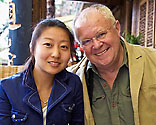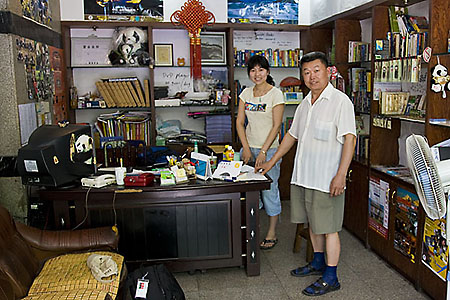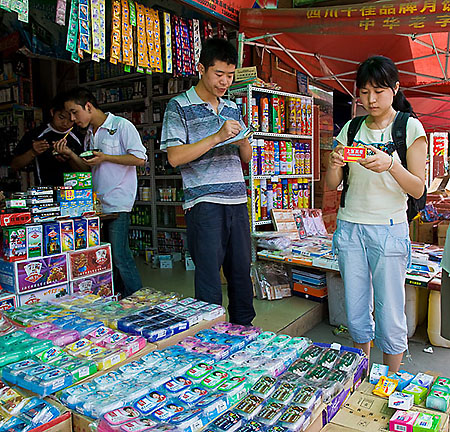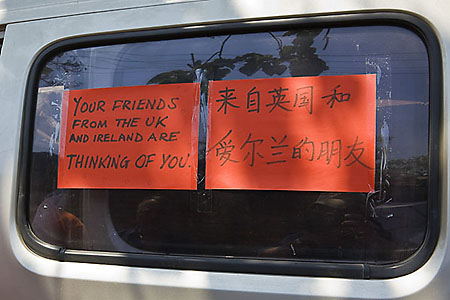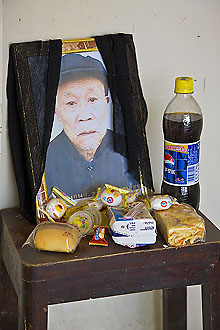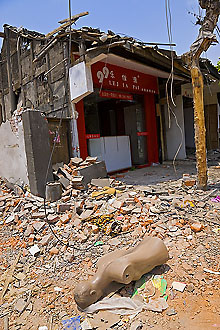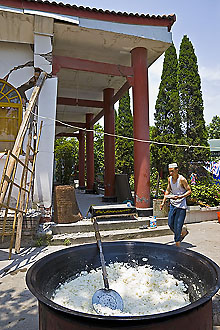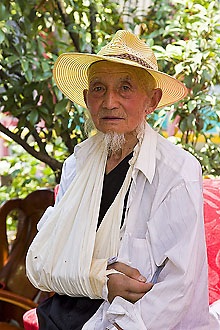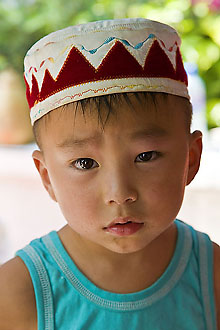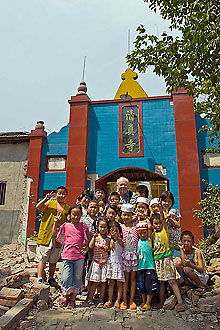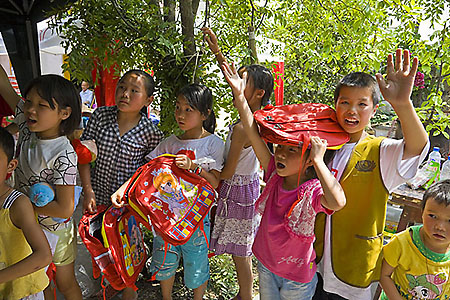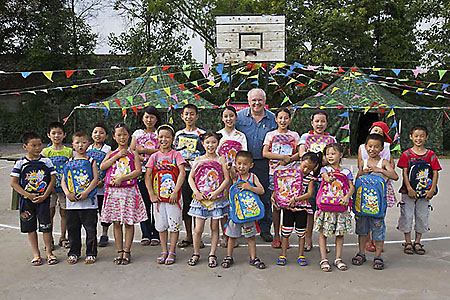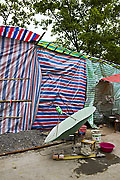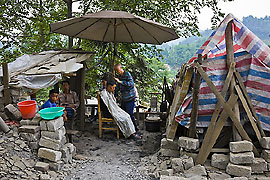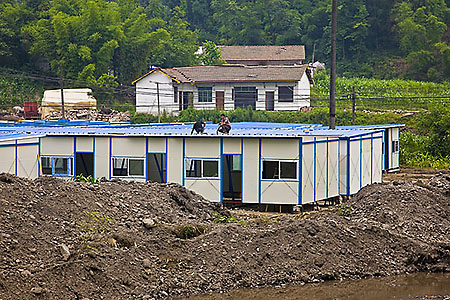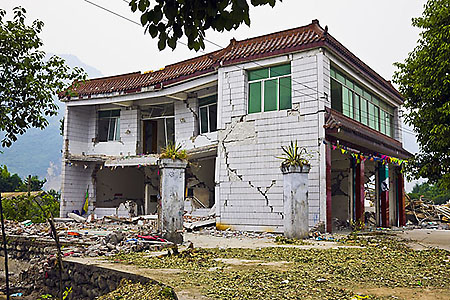|
CHINESE EARTHQUAKE 2008 When a devastating earthquake hit the Sichuan province of south west China I decided not to cancel the holiday which I had already booked but to go and take some much-needed supplies to some of those affected. The story was picked up by a local newspaper back in England and by the local BBC radio and television station in Oxford. This page is a record of that trip for friends and relatives in England, Scotland, Ireland and Australia who gave generous donations and helped in many other ways. My thanks to you all and also to all my Chinese friends who helped and encouraged the venture. |
|
Seven visits to China in two years have convinced me that the Chinese are more like us than I had ever imagined. I have made some good friends among ordinary Chinese people. My Chinese friends are not like the new rich Chinese I have seen – flashing their gold cards for the duty free as they fly back to China from college in the UK, or driving around Beijing in their Bentleys. My friends work incredibly long hours for little pay and yet never complain. With a profound sense of family responsibility, their values remind me of those in the England of my childhood. Intrigued to discover how my Chinese friends would react to our very different culture, three of them have been to the UK on visits which I have sponsored. The Chinese adopt English forenames when learning English at school, and I can’t help feeling that this is a pity because their real names sound so lovely. In China the family name comes first. Xie HongKun (Kathleen) (below left) is a tour guide in Beijing.
Lin YaTing (TingTing) (above centre, with John Henshall) produces educational material in Chengdu and Li TianYin (Troy) (above right) is a curator of paintings and calligraphy at the Palace Museum (Forbidden City) in Beijing. All are fascinating young people, from whom I have learned much about China and – dare I admit it – about life. On the 12 May 2008, I was visiting my son Johnny at University in Brighton on his twenty first birthday. Driving back to Stanford in the Vale I heard on the radio that a devastating earthquake had hit the Sichuan province of China. I had already booked my next trip – to Chengdu, the provincial capital of Sichuan, very close to the earthquake's epicentre. I had had a text message from TingTing just a few minutes before the earthquake struck but when I tried to ring, to check how she was, the phone system was overloaded. Eventually I had a message to reassure me that she was safe and well. The next few nights she spent sheltering in a car in the open, as far as possible from buildings, with her parents, waiting for the big aftershocks. After the news of the scale of the earthquake, everyone assumed I would cancel my trip. But the flight was paid for and the ticket was non-refundable. So what could I do in Chengdu?
Another of my Chinese contacts is Wang YuYing (known as Angie Wong), a travel agent operating in Sam’s Guesthouse in Chengdu. Chengdu is the place to see Pandas and is one of the main departure points for trips to Tibet. Angie had arranged two trips to Lhasa for me on previous visits – one as recently as the beginning of March. I managed to contact Angie by phone and she confirmed that tourism was virtually closed down. She also told me that she had visited the earthquake area and that the scale of the disaster was enormous. It was during that phone call that I decided that I would take some relief to children who now had nothing. Angie offered to help by identifying schools which needed help. We wanted to bring some joy to their faces. Over the next few days I collected more than £1,500 from generous friends and family in the UK, Ireland and Australia before flying out to Chengdu. Once there I suggested going to a supermarket to make the purchases but Angie had a better idea: the wholesale market.
Here the money went much further. We loaded two vans with everything from school supplies to sports equipment, mosquito repellent to sanitary supplies.
Angie’s father, Wang FuQuan, and boyfriend, Su WenQing, drove the vehicles and we went up into the mountains to some of the worst affected communities.
In the village of Luoshui, in the outskirts of Shifang, we saw a whole shopping street which had been destroyed. In the shell of one building was a small shrine to the shopkeeper’s father. Aged ninety, he had lived through all the twentieth century changes in China, only to be killed in the 'quake.
The mosque in Luoshui had been left in a perilous state by the tremors but forty families were being looked after in the grounds. The eighty year old Imam was injured. A woman showed me a picture of her eleven year old son who had been killed when the local school collapsed. As I looked at the sadness in her eyes I struggled to fight back my own tears. Yet despite the state they were in, they were pleased to see us and even invited us to lunch, cooked in the open in huge woks.
The children’s faces were particularly sad, so we decided that they would be the first recipients of our gifts. It was heartwarming to see how the empty faces of those left with nothing by the earthquake could be transformed by the items we were able to hand over. Our next stop was to drop off much-needed supplies at a school operating under canvas.
This was controlled by the military, as many local people were camping in the grounds. At first there was some suspicion but this soon melted away when it became apparent that our mission was one of friendship and goodwill. As we left, I shook hands with each of the stern faced soldiers who had helped unload the van. Their faces broke into broad grins and they seemed young enough still to be at the school. Next day we ventured further into the mountains, to Xinxing and Tongji, where the devastation in the narrow valleys was, if anything, even more concentrated. Yet despite this there were already signs of things returning to normal.
Tents by the roadside had satellite dishes outside. A barber had re-started business on the ruins of his premises, with improvised living accommodation on one side and a waiting area on the other. Life and business must go on.
As we drove around, what impressed me greatly was the organisation by the Chinese government. Troops were everywhere, marching along the road with shovels over their shoulders, or clearing rubble and erecting pre-fabricated housing. Although the 12 May earthquake has now given way to other news stories, the people there will have to cope with its consequences on a daily basis for many years to come. The number killed is equivalent to half the population of Oxford. Almost half as many again are missing. The number injured is twice the population of Oxford. The area affected is roughly equivalent to the size of Portugal. The number of people made homeless is equivalent to the entire population of Norway. The scale of the disaster truly is immense. To see, smell and travel through mile after mile of devastation wreaked by nature over such a wide area at the same time is totally overwhelming. It makes you realise just how fragile our existence on this planet really is. My only slight regret is that, after ten days in the area, I cannot be sure that I felt even one of the many aftershocks. So I still cannot say what it is like when the earth really does move. The people I met in Sichuan were delighted that foreigners had heard about their plight and cared enough to visit them to show their support. Seeing first hand the stoicism and fortitude of the Chinese people affected by this tragedy has been one of the most profound and humbling experiences of my life.
JOHN HENSHALL |

